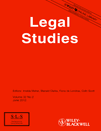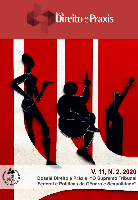
Legal Studies
Scope & Guideline
Navigating Contemporary Legal Issues with Expertise
Introduction
Aims and Scopes
- Feminist Legal Theory:
The journal explores the application of feminist perspectives to legal issues, examining how laws affect women and gender minorities, and advocating for reforms that address systemic inequalities. - Intersectionality:
Research often considers how various identities (such as race, gender, and class) intersect and influence legal outcomes, emphasizing a holistic approach to understanding legal issues. - Social Justice and Activism:
Legal Studies publishes works that connect legal theory to social justice movements, especially those advocating for marginalized groups, including discussions on #MeToo, prison abolition, and gender-based violence. - Global Perspectives on Law:
The journal incorporates international viewpoints, addressing legal issues in diverse cultural contexts and examining the impact of colonial legacies on contemporary legal practices. - Legal Reform and Policy Analysis:
A significant focus is placed on analyzing existing laws and proposing reforms, particularly in areas affecting women's rights, family law, and reproductive justice.
Trending and Emerging
- Gender-Based Violence and Legal Responses:
There is a growing emphasis on exploring legal frameworks surrounding gender-based violence, including critiques of carceral feminism and the push for decarceral approaches that prioritize survivor needs. - Transfeminism and Non-Binary Identities:
The journal increasingly addresses issues related to transfeminism and non-binary identities, reflecting a broader societal recognition of gender diversity and the legal challenges faced by these communities. - Decolonization and Legal Reform:
Emerging themes include the decolonization of law and legal practices, with a focus on how colonial legacies impact contemporary legal systems, especially concerning gender and race. - Mental Health and Law:
Recent discussions are beginning to incorporate mental health issues within legal contexts, examining how the law interacts with mental health, particularly in relation to marginalized groups. - Activism and Law Reform Movements:
The journal is increasingly featuring research on activism as a form of legal reform, highlighting grassroots movements and their impact on policy changes and legal recognition.
Declining or Waning
- Traditional Gender Roles in Law:
There is a noticeable decline in papers addressing traditional gender roles within legal frameworks, as contemporary discussions increasingly favor intersectional and fluid understandings of gender. - Conventional Legal Education:
Research centered on conventional legal education methods and curricula is waning, giving way to more innovative approaches that incorporate feminist and critical theories into legal pedagogy. - Historical Legal Analysis:
While historical legal analysis remains relevant, there has been a reduction in publications focusing solely on historical perspectives without connecting them to contemporary issues, particularly in feminist contexts. - General Gender Discrimination:
Research that simply addresses gender discrimination without a nuanced intersectional lens is becoming less prevalent, as scholars increasingly recognize the complexity of gender issues in law. - Non-Feminist Perspectives on Law:
The journal has seen a decline in submissions that do not align with feminist or progressive legal theories, as the focus shifts towards more critical and activist-oriented legal scholarship.
Similar Journals

COLUMBIA LAW REVIEW
Elevating Conversations on Law and JusticeCOLUMBIA LAW REVIEW, published by the COLUMBIA JOURNAL TRANSNATIONAL LAW ASSOCIATION, is one of the foremost legal journals in the United States, committed to advancing the discourse on critical legal issues. With an ISSN of 0010-1958 and an E-ISSN of 1945-2268, this prestigious publication has established a strong reputation, reflected in its Q1 rank in Law and a Scopus ranking of #145 out of 1025 journals in the social sciences category, placing it in the 85th percentile. COLUMBIA LAW REVIEW serves as a vital platform for legal scholars, practitioners, and students, publishing notable articles, case studies, and commentaries that influence both academic and practical perspectives on law. With a publication history spanning multiple decades, from its converged years of 1973 to 2024, it remains a key resource for those looking to stay updated on contemporary legal thought and developments. While it operates under a traditional subscription model, the journal’s rigorous peer-review process ensures the highest quality of scholarship in the legal field, solidifying its importance for both emerging and established legal professionals.

Direito e Praxis
Exploring the intersections of law and society.Direito e Praxis is a pioneering open-access journal dedicated to the interdisciplinary study of law, published by the esteemed Universidade do Estado do Rio de Janeiro, Faculdade de Direito. Since its inception in 2010, the journal has fostered scholarly communication in legal studies, providing a platform for researchers, practitioners, and students to engage with contemporary legal theories and practices. With a distinctive focus on the interplay between law and social dynamics, Direito e Praxis invites submissions that illuminate critical legal issues through diverse methodological approaches. In an era of increasing globalization and complexity in legal matters, this journal plays a vital role in disseminating knowledge and promoting dialogue among academics and legal professionals, particularly in the Latin American context. Researchers and students are encouraged to explore the wealth of articles that highlight innovative perspectives and contribute to the ongoing development of legal scholarship.

Alternative Law Journal
Unpacking Complexities at the Intersection of Law and Sociology.Alternative Law Journal, published by SAGE Publications Ltd, stands as a pivotal platform for critical discourse within the fields of law, sociology, and political science. Since its inception in 2008, the journal has fostered innovative scholarship aimed at exploring the intersections of legal practices and social justice, making it an essential resource for researchers, practitioners, and students alike. With its current ranking at Q3 in both the Law and Sociology categories according to the latest Scopus metrics, the Alternative Law Journal ensures a robust academic discourse, promoting diverse perspectives and challenging conventional norms. The journal's address reflects its international reach, further underscoring its commitment to fostering a global dialogue on pressing legal and societal issues. This journal is crucial for anyone seeking to stay updated with contemporary thoughts and research impacting law and society.

MINNESOTA LAW REVIEW
Championing Rigorous Analysis in Legal DiscourseMINNESOTA LAW REVIEW is a prestigious academic journal dedicated to advancing legal scholarship and discourse, published by the MINN LAW REVIEW FOUND in the United States. Established in 1976, this journal has become a cornerstone in the field of law, achieving an impressive Q1 ranking in the Law category for 2023, underscoring its significance and influence in legal studies, with a Scopus rank placing it in the 65th percentile among social sciences law journals. The ISSN number for both print and electronic editions is 0026-5535, ensuring broad accessibility to its scholarly contributions. With a commitment to publishing innovative and analytical articles that address contemporary legal issues, the MINNESOTA LAW REVIEW serves as an essential resource for researchers, students, and legal professionals seeking to deepen their understanding and engage with critical legal concepts. While it does not currently provide open access, its wide array of topics spans various disciplines within law, fostering a vibrant academic community dedicated to the exploration of legal principles and their applications. The journal’s editorial office can be found at 229 19TH AVE SOUTH, UNIVERSITY OF MINNESOTA, MINNEAPOLIS, MN 55455, where a team of experts curates content that reflects the evolving landscape of legal thought.

Annual Review of Law and Social Science
Empowering Research at the Confluence of Law and SocietyThe Annual Review of Law and Social Science, published by ANNUAL REVIEWS, is an essential interdisciplinary journal that bridges the domains of law, sociology, and political science. Established in 2006, this pivotal resource has consistently been recognized for its scholarly excellence, achieving a Q1 ranking in both the Law and Sociology and Political Science categories as of 2023. With a remarkable Scopus ranking that places it in the 93rd percentile among law journals, it serves as a vital platform for researchers and professionals seeking to engage with comprehensive reviews of contemporary issues at the intersection of these fields. Although not an open-access journal, its contributions are fundamental for advancing scholarship and fostering deeper insights into the relationship between social dynamics and legal frameworks. The journal's rigorous annual reviews provide valuable syntheses of the latest research, making it an indispensable resource for academics, policymakers, and students alike.

Denver Law Review
Advancing legal discourse for a dynamic future.Welcome to the Denver Law Review, a distinguished journal published by the University of Denver, Sturm College of Law that serves as a pivotal platform for the exploration and discussion of contemporary legal issues. With its ISSN of 2469-6463, the journal has established itself within the legal scholarship community, holding a notable Q2 rank within the field of Law according to the 2023 category quartiles. The Denver Law Review is committed to advancing legal research and scholarship, providing open access to critical insights and analyses essential for practitioners, scholars, and students alike. With an impact factor bolstered by its Scopus ranking at 620/1025, the journal facilitates rich scholarly conversations and promotes the understanding of the law in today's dynamic context. We invite you to explore the innovative articles and research that contribute to the evolving landscape of jurisprudence.

Washington International Law Journal
Connecting Scholars and Practitioners in International LawWashington International Law Journal is a distinguished publication dedicated to the field of international law, published by the University of Washington. With an ISSN of 2377-0872, this journal provides a vital platform for scholarly discourse and critical analysis on global legal issues, ranging from human rights to trade law. Although it currently does not offer open access options, the journal aims to facilitate the dissemination of pioneering research and insightful commentary from leading scholars and practitioners in the field. It holds significant value for researchers, professionals, and students seeking to deepen their understanding of international legal frameworks and their implications worldwide. The journal’s commitment to fostering academic excellence positions it as an essential resource for anyone engaged in the dynamic landscape of law on an international scale.

UCLA LAW REVIEW
Exploring the frontiers of legal thought and practice.UCLA Law Review, published by the University of California, stands as a premier legal journal that has been at the forefront of legal scholarship since its inception in the late 1960s. With an ISSN of 0041-5650 and an E-ISSN of 1943-1724, this journal has established itself within the legal community, achieving an impressive 2023 Q1 ranking in the Law category, and placing 139th among 1025 journals in the Social Sciences – Law category on Scopus, reflecting its strong international reputation and influence in the field. While the journal is not open access, it continues to provide an essential platform for legal scholars, practitioners, and students alike, fostering intellectual discourse and contributing to the advancement of law and policy. With a dedicated address at Scholarship Law, 405 Hilgard Ave, Los Angeles, CA 90024, UCLA Law Review remains committed to publishing rigorous analyses of contemporary legal issues, encouraging submissions that push the boundaries of existing scholarship and engage with critical, emerging topics in the law.

Feminist Legal Studies
Challenging norms, shaping legal futures.Feminist Legal Studies is a prominent academic journal established in 1993, published by Springer in Switzerland, and has quickly become an essential resource for scholars and practitioners in the field of Gender Studies. With an ISSN of 0966-3622 and an E-ISSN of 1572-8455, this journal is known for its rigorous peer-reviewed articles that explore the intersection of gender and law, advocating for a critical examination of legal structures through a feminist lens. Ranked in the Q2 category of Gender Studies for 2023, and positioned at #53 out of 213 in Scopus rankings, it holds a significant place in the academic discourse, reflecting its commitment to advancing knowledge and fostering dialogue in an evolving field. The journal operates on a traditional subscription model but may also feature open-access options for select articles, broadening its reach to a diverse audience. With a focus from 1993 to 2002 and resuming from 2005 to 2024, Feminist Legal Studies continues to bridge theoretical insights with practical implications, making it a vital publication for researchers, legal professionals, and students alike who aspire to contribute to feminist theory and practice.

Derecho PUCP
Elevating legal studies with critical insights.Derecho PUCP is a distinguished open access journal published by the Pontificia Universidad Católica del Perú, specifically from the Faculty of Law. With a commitment to advancing legal scholarship, this journal has been an essential resource in the field of law since 2005, providing researchers, practitioners, and students with access to critical analyses and discussions on various legal topics. Based in Lima, Peru, Derecho PUCP holds a prestigious position with a Q2 ranking in the Law category, reflecting its impactful contributions to the social sciences, particularly in the legal domain. The journal publishes cutting-edge research and promotes innovative discourse, aiming to foster academic excellence and engage with contemporary legal challenges. As it continues to converge into its future issues from 2019 to 2024, Derecho PUCP exemplifies a vital platform for those committed to the pursuit of legal knowledge and research.